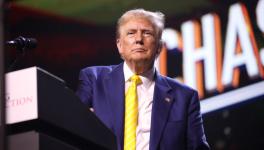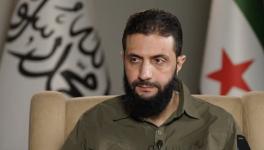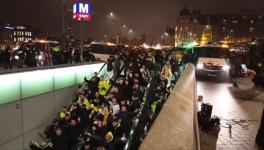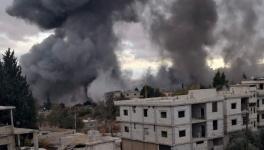Palestine: EU’s Borrell Bats for US
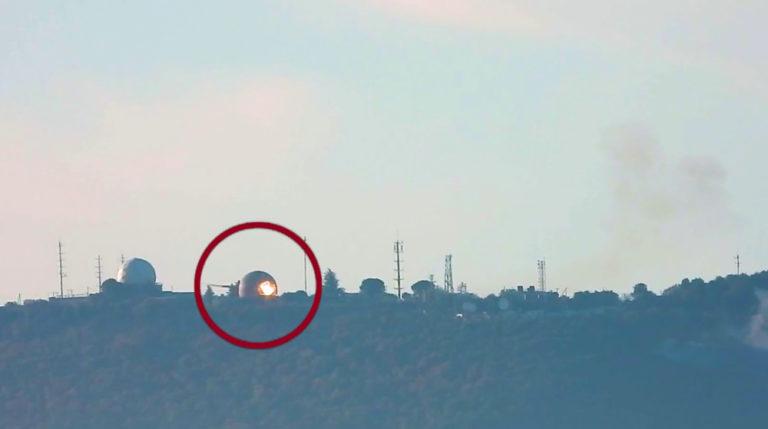
Screengrab of a Hezbollah anti-tank guided missile hitting a radar dome at Israeli air base on Mount Meron, Jan. 6, 2024
The diplomatic arena of the Middle East (West Asia) was dominated in the past week by the US Secretary of State Antony Blinken’s regional tour to Türkiye, Jordan, Qatar, the UAE, Saudi Arabia, Israel, the West Bank and Egypt. It was a ‘road show’ to rally the leaders of the Arab countries behind the US but culminated in an acrimonious meeting in the West Bank between Blinken and the Palestine President Mahmoud Abbas marred by “quarrels and arguments,” according to Sky News Arabia.
The region is gripped by angst that Israel may provoke a fateful expansion of the conflict in the Gaza Strip to Lebanon and Iran after the assassination of a number of senior military figures from Hamas and Hezbollah in the recent days, which overlapped Blinken’s presence in the region and underscored Tel Aviv’s disdain toward diplomatic niceties. Two videos from the West Bank showed Israeli troops shooting a 17-year-old boy and repeatedly running over the dead body of a man they had shot last Friday.
The US fears the expansion of the conflict in West Asia. Yet, Blinken was burdened with the contradiction that the rhetoric of Washington’s continued support for the Israeli operation is so visibly at odds with the words of President Joe Biden last week that he was doing “quiet” work with the Israeli government “to get them to significantly reduce their presence and largely withdraw from the Gaza Strip.”
Blinken claimed that “the (Arab) countries agreed to work together to help the Gaza Strip stabilise, chart a political path for the Palestinians and work towards long-term peace, security and stability in the region.” At the same time, he conceded that to do this, it is necessary to end the conflict in Gaza and identify a concrete path to the creation of a Palestinian state. Blinken flagged that the countries of the region are still interested in normalising relations with Israel, but only on the terms of a settlement of the Palestinian-Israeli conflict. Arguably, these could be incipient signs of a road map emerging.
The killing of senior Hamas and Hezbollah officials indicates that Israel is not making significant progress on the battlefield and the leadership is under compulsion to gather ‘trophies’ and claim ‘victory’. In a hybrid war, such killings will not significantly weaken the resistance movement. An effective leader was appointed overnight to head the IRGC’S Quds Force when the legendary Iranian general Qassem Soleimani was assassinated in 2020.
That said, the probability of a direct conflict between Israel and Hezbollah should not be overestimated, since the latter is well aware that an outbreak of hostilities is precisely what suits Tel Aviv. Iran also sizes up Israel’s calculus to drag the US into the war. According to reports, Iran has supplied cruise missiles to Hezbollah.
Against such a tumultuous backdrop, in a carefully choreographed sideshow, the European Union’s foreign policy chief Josep Borrell also appeared in the region at the same time as Blinken. Borrell’s destinations were Lebanon and Saudi Arabia. The EU announcement said that Borrell’s mission “will be an occasion to discuss all aspects of the situation in and around Gaza, including its impact on the region, especially the situation at the Israeli-Lebanese border, as well as the importance of avoiding regional escalation and of sustaining the flow of humanitarian assistance to civilians.”
While speaking to the media in Beirut, Borrell was highly critical of Israel’s war in Gaza and called for a pause “that could become a permanent one.” He also said, “It is imperative to avoid a regional escalation. It is absolutely necessary to avoid Lebanon being dragged into a regional conflict.” Borrell saw his mission as one to take stock of the situation and “to contribute to a way out of the crisis.”
Borrell met with the Head of Mission and Force Commander of the United Nations Interim Force in Lebanon (UNIFIL) General Aroldo Lazaro, a compatriot from Spain. Indeed, there has been some talk of deploying a peacekeeping force on Israel’s northern border with Lebanon.
Meanwhile, Al Jazeera reported, citing a government source in Beirut, that Borrell also had an unpublicised meeting with a delegation from Hezbollah led by Mohammad Raad, a member of the Lebanese legislature. Conceivably, this might have been a key item on his itinerary in Beirut.
While the US and several European countries, including Germany, the UK, Czech Republic, Austria, among others, regard Hezbollah as a terrorist organisation, the EU restricted itself to merely adding Hezbollah’s so-called “military wing” to its terror list, leaving the door open to interact with the movement’s political leadership if need arises.
That came in the wake of the group’s alleged 2012 suicide bus bombing in Burgas, Bulgaria, which killed five Israeli tourists and a Bulgarian driver. During a debate on the crisis situation in Lebanon last July, the European Parliament, for the first time, adopted a resolution calling for the EU to add the whole of Hezbollah to its list of banned terrorist organisations, but that hasn’t yet been acted upon.
Borrell’s meeting with the Hezbollah delegation would only have been with the knowledge of the Biden administration — it could even be providing a thinkable (and actionable) leitmotif of Borrell’s trip to Lebanon. BBC had reported a week ago on secret contacts between Israel and Hezbollah as well.
At any rate, by a coincidence, Borrell happened to be in Saudi Arabia when Blinken arrived there, and the two of them had a meeting. Later, in a prepared statement to the media after talks in Saudi Arabia with foreign minister Prince Faisal, Borrell also took a nuanced stance apropos Hamas, saying,
“And now we have to stop the killing of civilians in Gaza. We have to stop this great number of casualties. Hamas has to be eradicated. But Hamas is an idea, it represents an idea, and you cannot kill an idea. The only way of killing an idea –- a bad idea — is to propose a better one, to give a horizon to the Palestinian people, to their dignity, to their freedom, to their security, which has to go hand in hand with the security of Israel.”
Clearly, Borrell strove to break the ice by engaging with Hezbollah. Considering that the EU has been the US’ junior partner on major international issues, Borrell’s mission can be considered as substantive aimed at opening a diplomatic track to ease the Israel-Lebanon border tensions.
Equally, Borrell and Prince Faisal rekindled the so-called Peace Day Effort launched in September last year jointly by the EU with Saudi Arabia, the League of Arab States, Egypt and Jordan as an initiative “to reinvigorate the peace process in the Middle East.”
A joint statement issued at that time on the sidelines of the 78th session of the UN General Assembly, in the presence of almost fifty Foreign Ministers from around the world sought “to produce a “Peace Supporting Package” that will maximise peace dividends for the Palestinians and Israelis once they reach a peace agreement,… thus incentivising earnest efforts to reach it.”
As EU foreign policy chief, Borrell navigated international turbulence and divisions within the 28-member bloc to make Europe more united and turn it into a diplomatic heavyweight, but with patchy success. Of course, Ukraine spoiled the party. Palestine could well be Borrell’s last waltz. Borrell’s five-year term in Brussels ends in December.
MK Bhadrakumar is a former diplomat. He was India’s Ambassador to Uzbekistan and Turkey. The views are personal.
Get the latest reports & analysis with people's perspective on Protests, movements & deep analytical videos, discussions of the current affairs in your Telegram app. Subscribe to NewsClick's Telegram channel & get Real-Time updates on stories, as they get published on our website.










